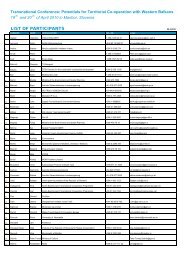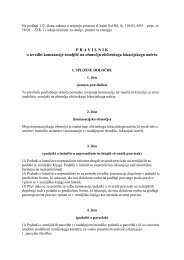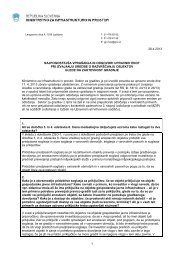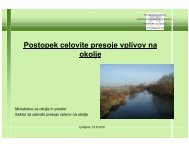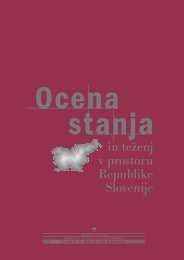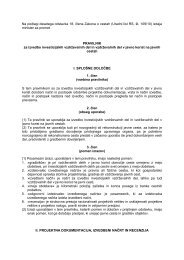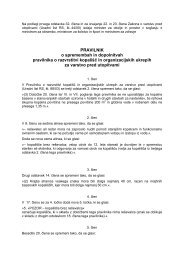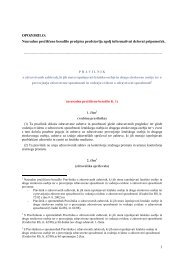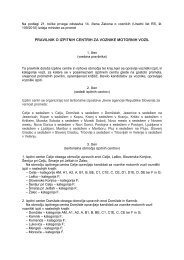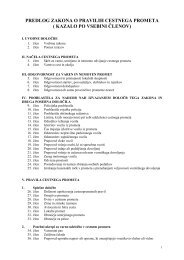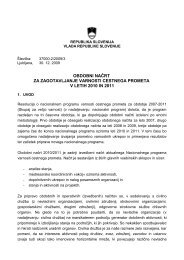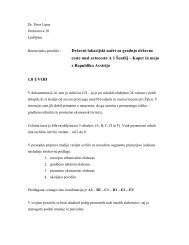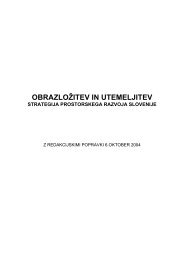evropska konvencija o krajini - Ministrstvo za infrastrukturo in prostor
evropska konvencija o krajini - Ministrstvo za infrastrukturo in prostor
evropska konvencija o krajini - Ministrstvo za infrastrukturo in prostor
You also want an ePaper? Increase the reach of your titles
YUMPU automatically turns print PDFs into web optimized ePapers that Google loves.
48Delavnica 1 / Workshop 1polje mitskega, ji preprečuje, da bi se posodobila<strong>in</strong> postala, v skladu s sodobnimi družbenimispremembami, manj urejena <strong>in</strong> manj pregledna.Ena predstava, sprejeta kot nespremenljiva,<strong>za</strong>gotavlja varnost <strong>in</strong> vzpostavlja jasno sliko otem, kaj je v pomenskem smislu središčni <strong>in</strong> kajobrobni <strong>prostor</strong>. K njej se <strong>za</strong>to <strong>za</strong>tekamo zlasti vodbobjih dejansko ali namišljeno ogroženeistovetnosti, saj nam daje občutek pripadnosti<strong>prostor</strong>u, ki ga naseljujemo. Kot je ugotovil žeangleški geograf Lowenthal, so kraj<strong>in</strong>e <strong>za</strong>ustvarjanje iluzije varnosti najustreznejše – vsajv preteklosti so se namreč zelo počasi, komajopazno sprem<strong>in</strong>jale 8 .Ker so skup<strong>in</strong>ske identitete vselej vsaj delno,nacionalna pa v celoti, zgrajene na mitologijah,ni presenetljivo, da so te mitologije tudi dejavnikioblikovanja pomenske členitve <strong>prostor</strong>a.Raziskava je raziskala, kako je k členitv<strong>in</strong>acionalnega ozemlja prispevala slovenskanacionalna mitologija. Ob dejstvu, dageografske <strong>in</strong> klimatske značilnosti določenegaobmočja vplivajo na izbiro določenih rab <strong>in</strong> tud<strong>in</strong>a to, kako se posamezne rabe <strong>prostor</strong>skostukturirajo, da na stukturiranost <strong>prostor</strong>avplivata družbeni sistem <strong>in</strong> ekonomska moč, nemoremo <strong>za</strong>nikati vpliva ideologije <strong>in</strong> političnestrategije, ki podobe kraj<strong>in</strong> ne določata nič manjkot gospodarski sistem.Kako poteka izbiranje posameznih krajev <strong>in</strong>kraj<strong>in</strong>skih tipov oziroma »<strong>in</strong>vestiranje smisla«?Izbiranje prv<strong>in</strong> v t. i. podobo nacionalnega<strong>prostor</strong>a, izbiranje »slovenskih« kraj<strong>in</strong> potekapreko osebnih mnenj, vendar je na končni ravnipredvsem rezultat sistemskega delovanjaideoloških aparatov države 9 , <strong>za</strong>radi česar jelahko podoba, s katero se kot nacija (ali skup<strong>in</strong>a)istovetimo, v marsičem različna od stvarnosti.Ključna pri tem je razlika med objektivnimi,fizičnimi <strong>prostor</strong>skimi strukturami tersubjektivno sliko, ki se (je) konstituira(la) <strong>in</strong> sevzdržuje <strong>in</strong> sprem<strong>in</strong>ja v procesih družbenekomunikacije.Na skup<strong>in</strong>ski ravni, zlasti na nacionalni, seosnovna istovetnost, »občutenje doma«dopolnjuje z občutenjem domov<strong>in</strong>e, ki je lahkoideological background of this relationship areall current issues with<strong>in</strong> Europe. With<strong>in</strong> thisnewly emerged all-embrac<strong>in</strong>g community someparts are still strongly rooted <strong>in</strong> their <strong>in</strong>dividual orcommon past. The assumptions govern<strong>in</strong>g therelationships toward landscape are quite <strong>in</strong>sidious,<strong>in</strong>clud<strong>in</strong>g the assumptions beh<strong>in</strong>d the conceptsof nature and its protection 7 . It is importantto be constantly rem<strong>in</strong>ded of their mighty presence.The nostalgic obsession with the past positions»the image of the homeland« <strong>in</strong> the field of mythand allows it to deny its own modernisation andto cont<strong>in</strong>ue to stay orderly and secure. One image,accepted us unchangeable, provides (imag<strong>in</strong>ed)security and constitutes a clear dist<strong>in</strong>ctionbetween what it symbolically central and whata marg<strong>in</strong>al space. It acts as a refuge for the sentimentalorientation <strong>in</strong> times of actually (orseem<strong>in</strong>gly) threatened identity, because it providesa fell<strong>in</strong>g of belong<strong>in</strong>g to the territory ashome. As was quite wittily observed by a Britishgeographer David Lowenthal landscapes are themost suitable tool for the creation of the illusionof safety – until our times they were a subject ofa very slow, almost unperceivable change 8 .While common identities are at partially, nationalidentities are entirely built on mythologies,thus it is not surpris<strong>in</strong>g that these same mythologiesare also the factors of the symbolic articulationof space. Research on the case ofSlovenia exam<strong>in</strong>ed how Slovenian national mythologycontributed to the articulation of thenational space. In spite the fact that geographicand climatic characteristics of a certa<strong>in</strong> areacondition the selection of the specific land useand the structural articulation of the land useand that articulation of space is also due to thesocial system and the level of economic power,the <strong>in</strong>fluence of the ideology and political strategycan not be denied – they condition the appearanceof landscapes no less that the economicsystem.The selection of the specific places and landscapes<strong>in</strong>to the general conception is based onthe assignment of mean<strong>in</strong>g. Specific landscapesor places emerge as representative of the whole,8Glej David Lowenthal, »Landscape as Liv<strong>in</strong>g Legacy«, v Meto Vroom ed. The Landscape of Symbols (Wagen<strong>in</strong>gen, 2002): 13-26.See David Lowenthal, »Landscape as Liv<strong>in</strong>g Legacy«, <strong>in</strong> Meto Vroom ed. The Landscape of Symbols (Wagen<strong>in</strong>gen, 2002): 13-26.9Ideološki aparati, kakor jih je opredelil Althusser, so prisotni v vsaki <strong>in</strong>stitucionalizirani skupnosti, tudi v Evropski Uniji.Ideological apparatus as def<strong>in</strong>ed by Althusser, are present <strong>in</strong> any <strong>in</strong>stitutionalized society, also <strong>in</strong> European union.10Glej David Lowenthal, »Past time, Present Place: Landscape and Memory« v The Geographical Review 1(1975): 1-36.See David Lowenthal, »Past time, Present Place: Landscape and Memory«, The Geographical Review 1(1975): 1-36.



